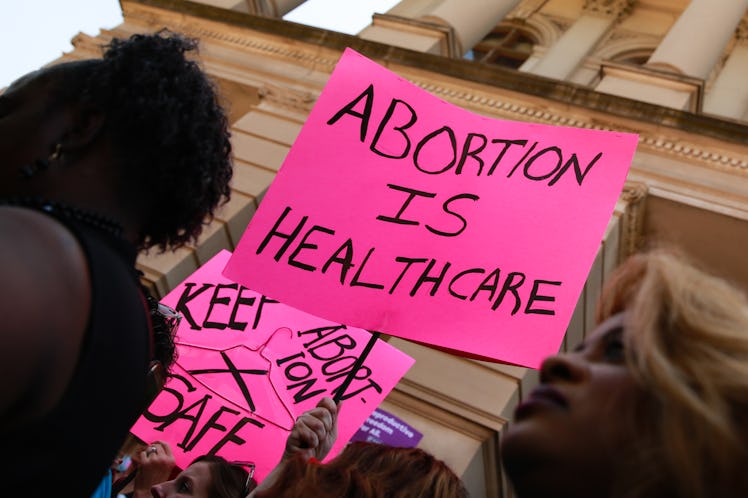
This State Is Actually Removing Abortion Restrictions, & This Might Help Explain Why
It's been an upsetting few weeks for advocates for reproductive rights. In the past weeks and months, states including Georgia, Missouri, and Alabama have introduced or passed new laws limiting or even effectively banning access to abortion. However, not all states working to legislate abortion are making it harder to access. Nevada's new abortion bill will remove restrictions so accessing reproductive care is is easier and safer for patients. Well, that's certainly a change.
On Wednesday, May 22, The Hill reported that the Nevada State Assembly voted to pass the SB197 bill on Tuesday, May 21, which repeals abortion restrictions, including a requirement that physicians tell patients about the “physical and emotional implications” of an abortion, as well as determine an individual's age and marital status before performing the procedure. The bill also decriminalizes giving patients abortion-inducing medication without a doctor's advice or approval, which would likely ease restrictions on self-managed abortion.
The bill passed the Nevada State Assembly by a 27-13 vote largely along party lines, with all Republicans opposing the bill. The vote is significant — Nevada has the first female-majority legislature in the country, and clearly, they have the willingness to make changes. Now, the bill will head to the Nevada State Senate, which has already passed similar measures, according to The Hill. From there, the legislation will head to Nevada Gov. Steve Sisolak, who has spoken in favor of abortion rights.
Following the Nevada State Assembly's decision, Democratic Sen. Yvanna Cancela spoke to the Associated Press about the impact of this legislation. "When the rest of the country may feel hopeless, may feel bleak, they should look to Nevada as the shining beacon that we are for women's rights," Cancela said.
The Assembly's decision is in contrast to the number of abortion bans that have passed or are in the process of passing within the United States.
On May 7, Georgia Gov. Brian Kemp signed HB481, also known as the Living Infants Fairness and Equality (LIFE) Act. This measure will ban abortions if a fetal heartbeat is detected by physicians, except in cases of rape or incest. Fetal heartbeats are usually detected around six weeks of pregnancy — a time period where many people aren't aware that they're pregnant.
On May 16, Alabama Gov. Kay Ivey signed the state's HB314, better known as the Human Life Protection Act, which is a near-total abortion ban that prohibits abortions even in cases of rape or incest. The only time abortion would be permitted is if the pregnant person's life is at risk. In addition, physicians who perform or attempt to perform an abortion could face up to 99 years in prison.
Finally, Missouri's state Senate has voted to pass HB126, also known as Missouri Stands for the Unborn Act on May 16. This bill would ban abortions after eight weeks of pregnancy, even in cases of rape or incest, and allow abortion only in cases of medical emergencies. This bill also includes a "trigger law," which would ban entirely ban abortions if Roe v. Wade, the 1973 Supreme Court case that decriminalized abortion in the United States, was overturned. The bill is awaiting the signature of Missouri Gov. Mike Parson, who has reportedly already stated that he plans to sign the bill.
Even though some states are continuing to pass anti-abortion legislation, other states are speaking up and fighting for reproductive rights. This issue has never been more urgent.